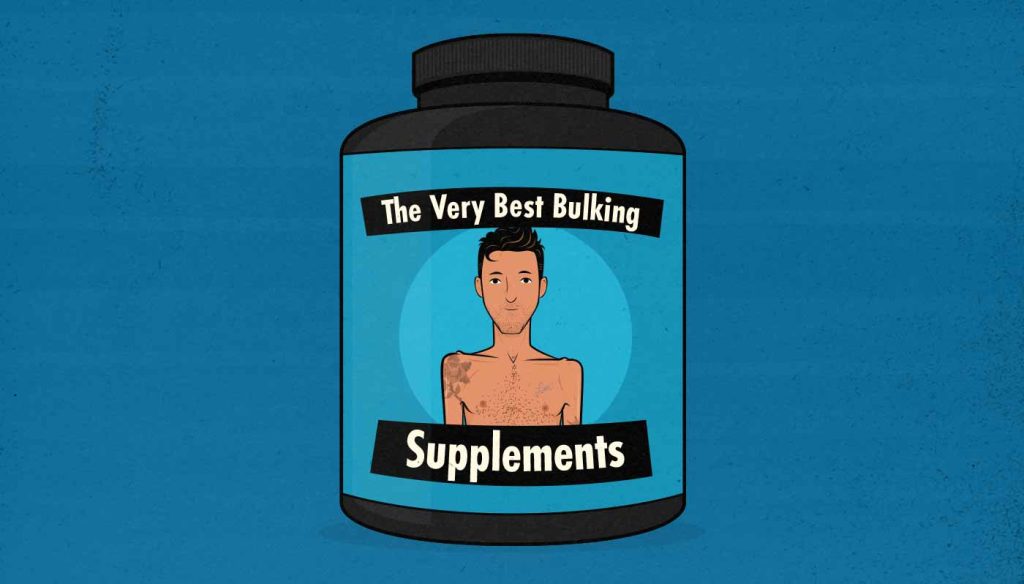
The Best Bulking Supplements for Skinny Guys
Over 5,000 shares and 500 comments later, here’s our revised supplement guide for skinny guys trying to build muscle in time for last summer. We’ll cover supplements that speed up muscle growth, such as creatine. We’ll review supplements that help skinny guys bulk up, like mass gainers. We’ll talk about pre-workout supplements, too.
When talking about supplements, we use research, personal experience, and over a decade of full-time coaching experience. We’ve each gained seventy pounds (naturally). We’ve also helped over 10,000 skinny guys bulk up with our Bony to Beastly Bulking Program. Marco has a degree in Health Sciences, and he’s trained hundreds of clients, ranging from everyday desk workers all the way up to college, professional, and Olympic athletes.
We don’t sell supplements. There are no affiliate links.
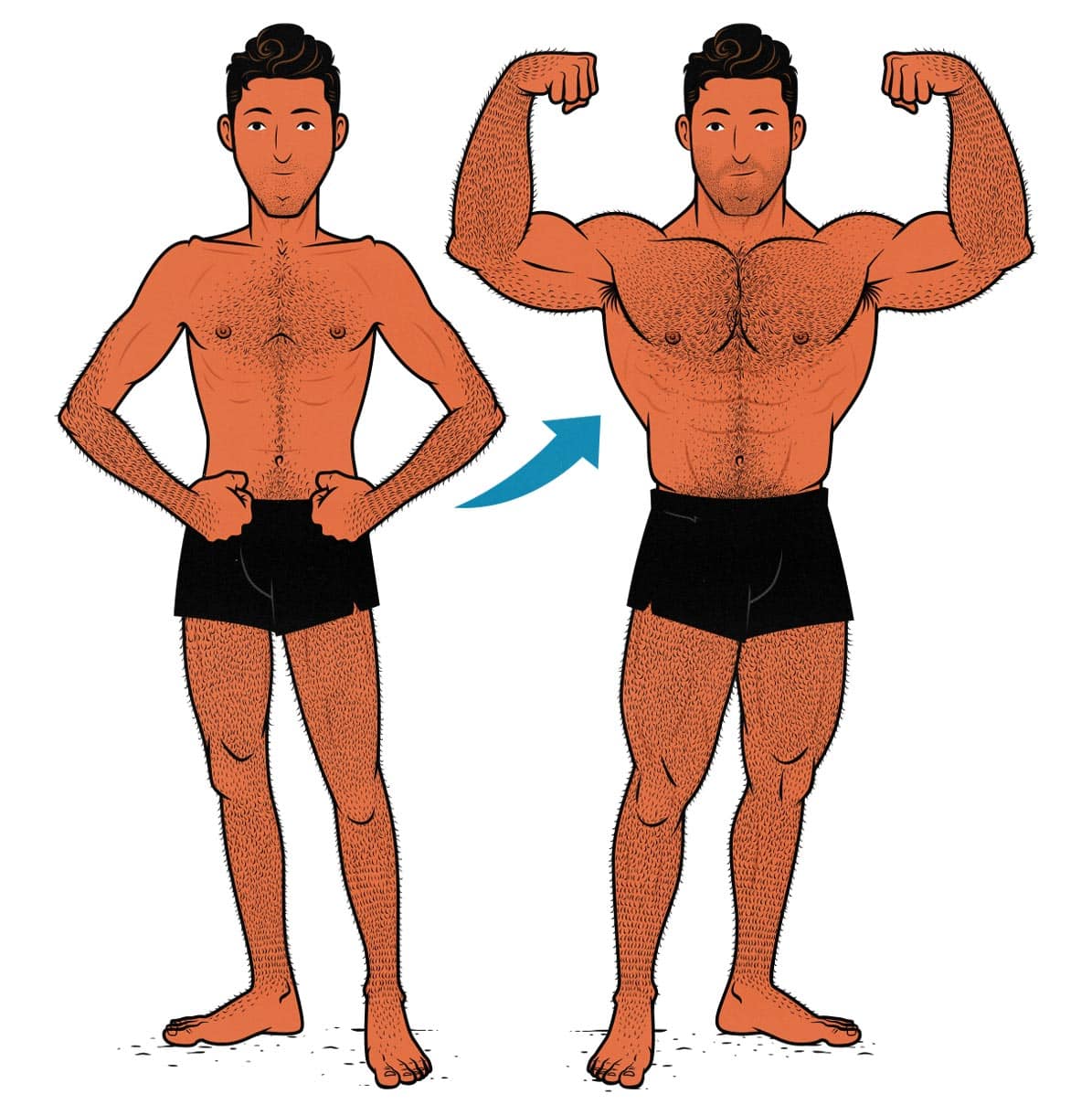
Skinny Guys Benefit From Different Supplements
As skinny guys, or “ectomorphs,” we have the opposite goal of everyone else. They want to lose weight; we want to gain it. We’re using a different set of criteria to evaluate the effectiveness of our supplements. More calories? Good. More weight gain? Good. Does it increase appetite? Perfect!
For example, consider branched-chain amino acids (BCAAs). BCAAs are a trendy ingredient in muscle-building supplement cocktails. However, BCAAs are simply a calorie-light version of protein powder. A standard serving of whey protein powder contains the same nutrients as a standard scoop of BCAAs. The difference is whey protein also contains many other amino acids and nutrients, making it far higher in calories.
BCAAs are fine if you’re looking for a low-calorie alternative to protein powder. But you aren’t. We’re hardgainers. We’re trying to eat more calories to gain weight. The more amino acids in a protein source, the better it will build muscle (study). Forget isolating the branched-chain amino acids. Give us all of them.
BCAAs are also popular with guys who practice intermittent fasting. Having BCAAs during the fasting period is thought to be a way to stimulate muscle growth without breaking your fast. However, intermittent fasting makes it harder to gain weight. That’s not good. At least not for us.
Protein powder is better than BCAAs. It’s cheaper, healthier, has more amino acids, and has more calories. It does everything BCAAs do but better.

Food is even better than protein powder. It’s even more nutritious, full of other macronutrients, fibre, vitamins, minerals, phytonutrients, and probiotics. This makes foods like lean ground beef, chicken breast, fish, Greek yogurt, and soy absolutely amazing for building muscle.
When looking at supplements, we need to keep our specific goal in mind: we’re bulking.
Do You Need Supplements to Get Good Results?
The short answer is no; you don’t need supplements to gain weight, build muscle, build it quickly, or build it leanly. To get great results, all you need to do is follow a good workout program, eat enough nutritious food, and get plenty of good sleep.
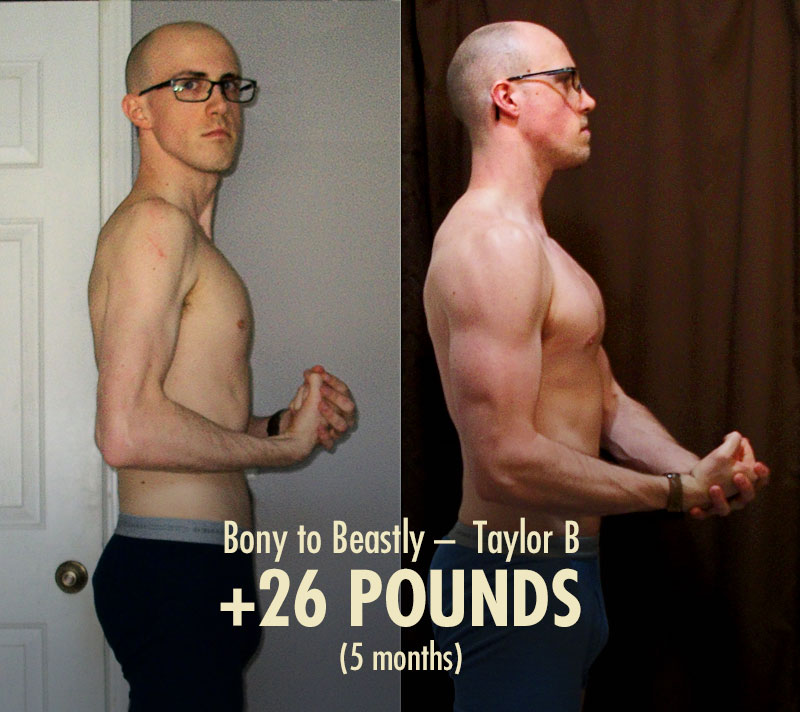
Without getting the fundamentals down, supplements are a waste of money. After all, even if you find a supplement that boosts your results by 50%, an extra 50% on top of nothing is still nothing.
If you already know the fundamentals of building muscle, though, supplements can help you do a few things:
- Supplements can make a bulking routine easier. For example, protein powder makes it easier to eat enough protein. It’s more convenient and less filling.
- Supplements can speed up your rate of muscle growth. For example, creatine allows you to build muscle more quickly. You might gain your first twenty pounds in fifteen weeks instead of twenty.
- Supplements can keep your gains leaner. Anything that speeds up your rate of muscle growth will make your muscles more voracious. They’ll hog more of the calories you eat, leaving fewer to spill over into fat gain.
- Supplements can improve consistency. For example, caffeine reduces the feeling of fatigue, giving you more energy to lift weights. Caffeine is also addictive (which is both good and bad). If you get in the habit of having caffeine before lifting, you might become addicted to your lifting routine.
The Very Best Bulking Supplements
The three best bulking supplements for skinny guys are:
- Creatine: improves our workout performance and speeds up our rate of muscle growth, allowing us to build muscle faster and more leanly.
- Whey protein: makes it easier to hit our daily protein goals without feeling stuffed.
- Caffeine: gives us the kick in the glutes that we need to get to the gym and lift like a Beast.
Let’s go into each one in more detail.
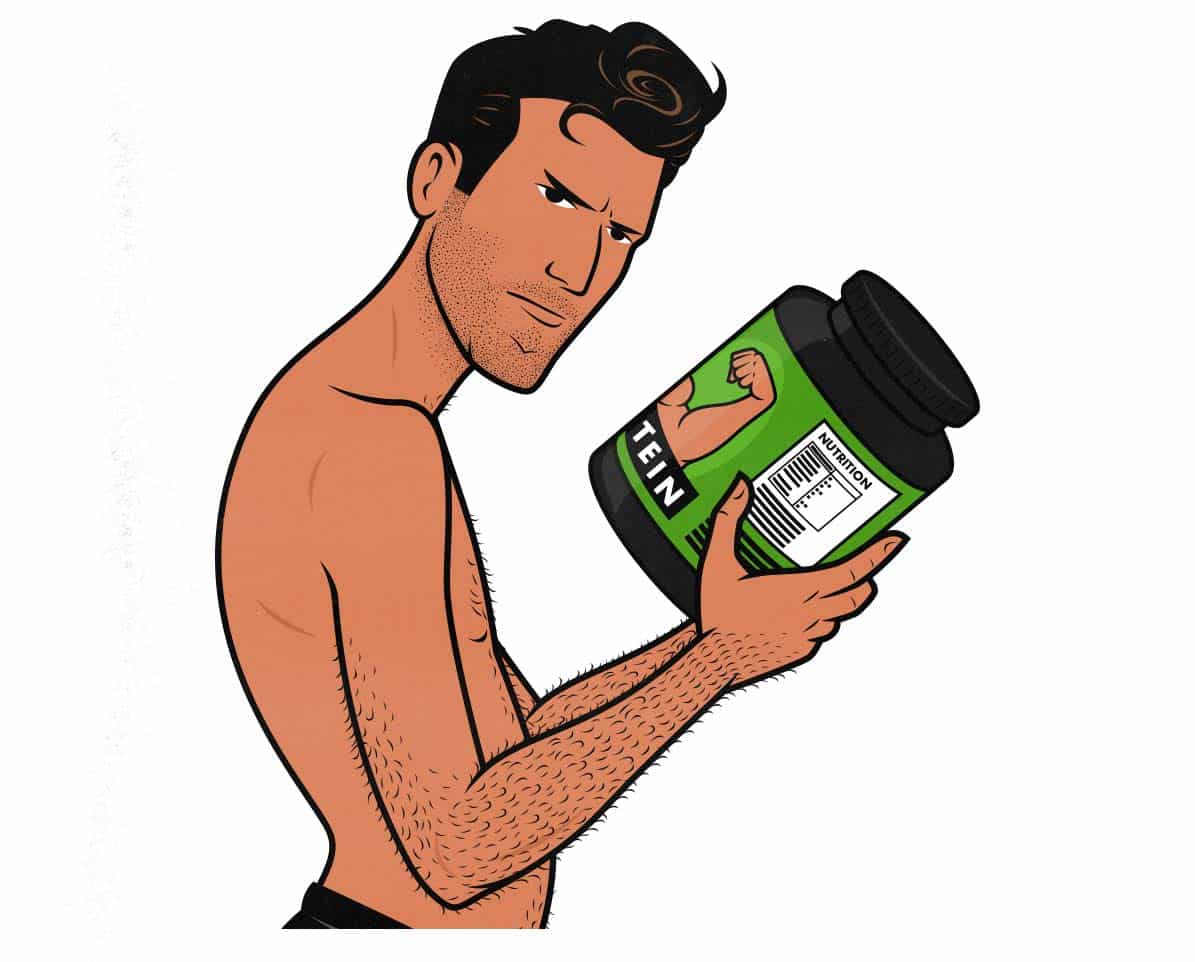
Creatine
Creatine is the most famous muscle-building supplement (study). Hundreds of studies show that it increases weight gain, lean mass gain, fat loss, and muscle growth. The latest meta-analysis found that it increases our rate of muscle growth by around 33%, at least during the first few months of supplementation.
The only thing you need to be mindful of is drinking enough water. Creatine pulls fluid into your muscles, so you might give yourself a stomach ache if you don’t have enough fluid available. That’s why creatine is normally mixed into drinks (such as water or protein shakes).
How Does Creatine Work?
Creatine improves muscle growth in two main ways:
- It helps your body replenish ATP, which is the type of fuel that you use when lifting weights. This allows you to eke out a couple of extra reps, stimulating more muscle growth.
- Creatine also improves muscle protein synthesis and glycogen storage. This means that not only will you build more muscle via your training, but you’ll also get more muscle out of the food that you’re eating.
How Much Extra Muscle Does Creatine Build?
What results can you get with creatine? How much weight will you gain? How much extra muscle will you build? That’s hard to answer because it depends on how much creatine you already have in your system. On average, people gain a couple of pounds of muscle, a couple of pounds of water, and lose a pound or so of fat (full explanation). It speeds up your rate of muscle growth by about 33% (full explanation).
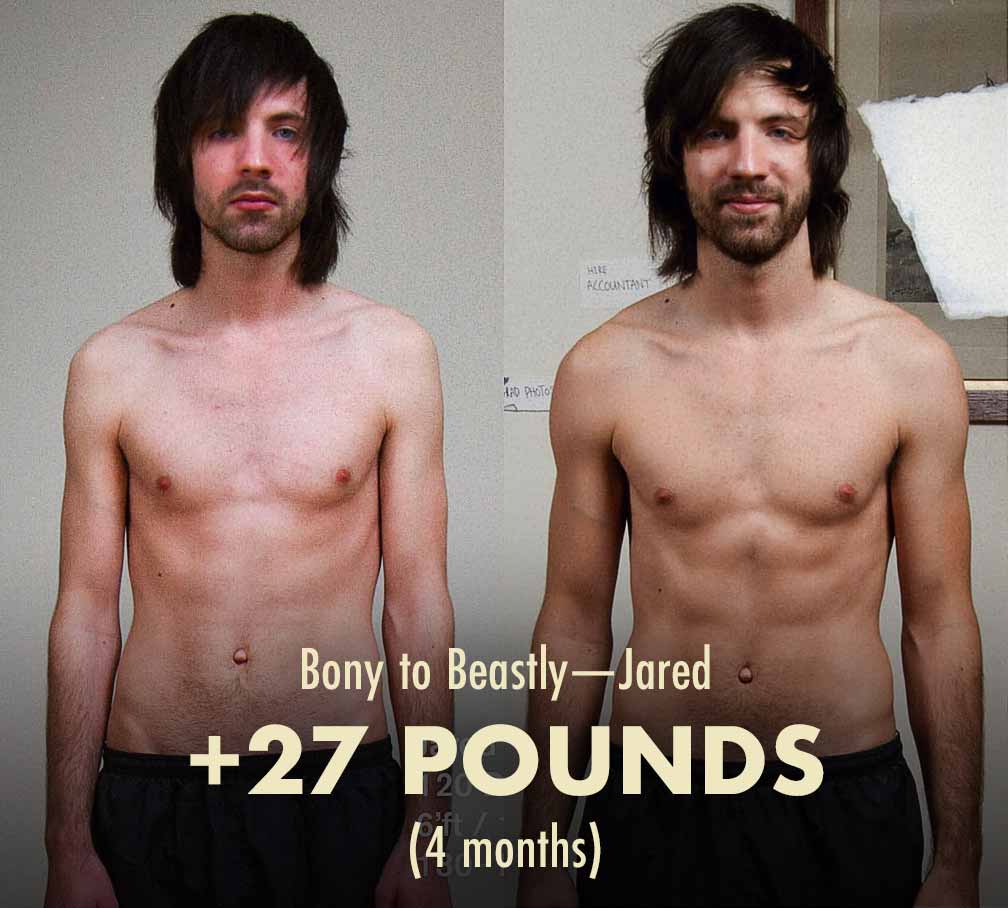
If you follow a good workout program, eat enough good food, and supplement with creatine, you’ll get great results. How much of that is from the creatine? It’s hard to say. Maybe a couple of pounds.
Does Creatine Affect Fat Gains?
Creatine can help you bulk more leanly. It will improve insulin sensitivity in your muscle cells. This means more of what you eat will be invested into muscle growth instead of stored as body fat.
Most of us ectomorphs naturally have good insulin sensitivity. Lifting weights will improve that insulin sensitivity, and gaining muscle will improve it further. It’s not something we necessarily need extra help with. But extra help is welcome.
Should You “Load” Creatine?
If you take 5 grams of creatine every day, it will take around a month to fully saturate your muscles. This will make your bulking progress seem nice and smooth. It will also reduce your risk of getting stomach aches. This has proven to be wonderfully effective for building muscle.
However, you could cut that loading period down to a week by taking four 5-gram doses per day. After that, you’d slow it down, taking just 5 grams per day. It’s unclear whether this offers any advantage.
Creatine Non-Responders
Roughly 25–33% of people don’t respond to creatine (study, study). These people are called non-responders. It’s unclear why some people respond to creatine and others don’t. If you’re a vegan or vegetarian, creatine seems to have a stronger effect. If you eat a lot of meat, it may have a weaker effect. It might be that people who eat plenty of creatine in their diets don’t benefit from supplementing with it.
Caffeine
The first and most important part of building muscle is stimulating muscle growth. You have to work out. Even when you’re tired. That’s where caffeine comes in. If you’re feeling low, caffeine will lift you up. It will carry you through your workouts.
We recommend having caffeine in normal, healthy doses. The amount you’d find in a cup or two of coffee. Something like 50–150mg. That’s enough to reduce your feelings of fatigue and improve your motivation. It’s not so much that it will interfere with your sleep or health, especially if you train earlier in the day.
Whey Protein
Our muscle fibres are constructed out of the protein we eat. That’s why it’s so important to eat enough protein (study, study). It’s also important to eat enough energy—enough calories. We use that energy to convert the protein we eat into muscle mass. That’s why a calorie surplus is so important.
If you’re eating in a calorie surplus and eating a reasonably balanced diet, you might already be eating enough protein. You only need around 0.7 grams of protein per pound of body weight per day. If you weigh 150 pounds, that’s only 105 grams of protein per day.
If you already have enough protein in your diet, supplementing with it won’t give you any extra benefit. On the other hand, if you aren’t eating enough protein, supplementing with it is an easy way to improve your results.
When’s the Best Time to Have a Protein Shake?
Most people have a scoop of whey protein right after working out, during the so-called anabolic window. That’s arguably the best time to have a protein shake, but you can have them at any time of day, ideally alongside snacks or meals.
How Much Whey Protein Can You Have Per Day?
Most people can get away with having 2–3 scoops of whey protein per day without any issues. That doesn’t mean you should have that much whey protein every day, just that it’s an option. The ideal scenario would be to get the vast majority of your protein from nutritious whole-food sources, such as lean cuts of meat, seafood, poultry, whole eggs, Greek yogurt, nuts, seeds, legumes, or even soy.
Is Whey the Best Type of Protein Powder?
Whey protein is cheap, well-studied, easily digested, and contains a great mix of amino acids. It also tastes reasonably good, at least compared to the other types of protein powder. It makes for the best default.
If you’d prefer to use a plant-based protein powder, no problem. Those are great, too. Almost all of them use a smart mix of plant-based protein sources that provide a perfect blend of amino acids.
Mediocre Bulking Supplements
Here are the supplements with a little bit of positive evidence behind them. These supplements may help you build muscle more quickly, but the effects are minor or situational.
Weight Gainers
Weight gainers can help skinny guys gain build muscle and gain weight. Most skinny guys have a hard time eating enough to gain weight. Weight gainers are packed full of easily digested calories, blowing the bottleneck off our ability to build muscle.
However, weight gainers are little more than protein powder with processed carbs. The protein generally comes from whey protein, and the carbs tend to come from maltodextrin. These powders are good for building muscle, but they aren’t rich in fibre or micronutrients.
It would be better for your long-term health if you blended up smoothies instead of shaking up gainers. That way, you get your carbs from oats and fruits instead of maltodextrin. You can get your protein from greek yogurt, nuts, seeds, and whole grains. Toss in some spinach for some extra nitrates. That way, you get all the vitamins, minerals, fibre, prebiotics, and probiotics you need.
Citrulline Malate
Citrulline malate is the best “pump” supplement on the market right now, and it’s faring quite well in the research. When digested, it converts into arginine, which turns into nitric oxide, and which dilates your blood vessels, allowing you to pump more blood into the muscles that you’re training. This enhanced muscle pump can improve the health of your blood vessels and increase muscle protein synthesis, which might help you gain a little more muscle.
However, eating a nourishing bulking diet will help you gain even more muscle and strength than pump supplements (study). If your diet includes foods like carrots, spinach, and beets, then you’re already consuming plenty of nitrates. Even better if you eat nuts, seeds, and garlic. This produces a stronger and more beneficial effect than pump supplements.
Beta-Alanine
Beta-alanine is creatine’s little brother. Both supplements improve the number of reps we can eke out while lifting weights, improving our ability to build muscle. It’s just that beta-alanine isn’t as powerful and only helps in certain circumstances.
The ideal dosage seems to be around 3–5 grams per day, taken at any time (similar to creatine). Be warned, though—it can create the sensation of being swarmed by spiders (paresthesia). Harmless but horrifying. I hate it so much.
Ashwagandha
Ashwagandha is an intriguing muscle-building supplement. The first study to make waves in the muscle-building world was this one, showing that ashwagandha can:
- Speed up muscle growth
- Increase strength gains
- Reduce fat gains
- Increase testosterone
- Reduce cortisol
To give you an idea of the magnitude of these effects, the 8-week study found a 15% greater increase in testosterone and a 44-pound greater increase in bench press strength when compared to the placebo group. That’s amazing, but if we look at a meta-analysis examining the overall body of evidence, the effects are less dramatic.
Ashwagandha may indeed help skinny guys build muscle. It might also help skinny-fat guys by improving their ability to build muscle while losing fat. And there don’t seem to be any negative side effects. On the other hand, the benefits aren’t dramatic.
Vitamin D
Vitamin D can increase our testosterone production if and only if we’re deficient in vitamin D. Most people are deficient in vitamin D, though, which makes this is a viable supplement for most people, especially during the winter.
Fish and Krill Oil
Fish oil contains healthy fatty acids (DHA and EPA). There’s a modest amount of evidence showing that supplementing with DHA and EPA can cause a small amount of muscle growth and fat loss (study). However, these effects are quite small. They’re also inconsistent.
Curcumin (aka Turmeric)
A recent systematic review found that curcumin reduces inflammation without interfering with our recovery process. It decreased muscle soreness and fatigue. That could theoretically allow you to benefit from higher training volumes. Curcumin also appears to be good for general health and digestion. These findings were mirrored in a second systematic review.
Underwhelming Bulking Supplements
Many bulking supplements are understudied and overhyped. They might help us build some extra muscle, but we just can’t say for sure yet, and it’s hard to know the downsides. As more research comes out, we’ll continue updating this list.
Ecdysteroids (including Turkesterone)
Ecdysteroids (such as turkesterone) are chemicals plants produce to defend themselves against insects. These chemicals cause the insects to moult—it makes their exoskeletons fall off. What’s interesting is that these chemicals seem to have steroid-like effects in some small animals.
Some ecdysteroids have human trials hinting at their effectiveness. For example, this study found that a spinach extract containing small amounts of ecdysterone caused the participants to gain extra muscle mass and strength.
However, the highest quality study looking into ecdysteroids for building muscle found no effects on our hormones, muscle growth, or fat loss (study). As a result, the International Society of Sports Nutrition doesn’t recommend ecdysteroids or turkesterone as muscle-building supplements (study).
This lack of enthusiasm is mirrored by experts like Eric Trexler, Ph.D., who told us, “At this time, there is not sufficient evidence to suggest that turkesterone enhances increases in strength or muscle mass in humans.”
HMB
HMB performed eerily well in a few studies, showing steroid-like muscle growth. These studies are infamous in the muscle-building community because of how suspicious they are. Furthermore, since HMB is found within protein sources, you may get the benefits simply from consuming enough protein.
Nitrates
The nitrates found in beets and leafy greens are knowing for being generally healthy, reducing muscle soreness, and even improving our lifting performance (study). However, there’s no need to supplement with nitrate. Most experts recommend eating more leafy green vegetables instead. Carrots, beets, garlic, and seeds can also help.
Collagen Protein
Collagen protein, known as hydrolyzed collagen or collagen peptides, is known for increasing gains in lean mass. Not by improving muscle growth, though. Collagen doesn’t increase muscle growth (study). Rather, it bulks up our connective tissues! It seems to be especially good for helping older lifters suffering from sarcopenia (age-related muscle loss) gain more connective tissue mass (study).
Arginine
Arginine supplements can’t be digested properly and thus cannot be effective. Researchers learned this and found another way to get the intended effect, giving us citrulline malate instead.
Baking Powder
Baking powder is beta-alanine’s evil twin. Baking powder mimics the effects of beta-alanine but with even more unwanted side effects. Not only will supplementing with baking powder make you feel incredibly sick and dehydrated, but a single dose also contains four times the recommended daily sodium intake.
Bulking Supplements for Vegans
There are a few supplements that are especially helpful for vegans. Our article about plant-based bulking has a full list of recommended supplements, as well as general best practices while bulking on a plant-based diet. Here’s a quick rundown, though:
- Vitamin B-12: The most common deficiency vegans encounter is a vitamin B-12 deficiency (study, study). As a result, most experts recommend that vegans take b–12 vitamins.
- Creatine: The more creatine you have in your muscles, the more quickly you can build muscle (meta-analysis). Since creatine naturally occurs in meat, vegans consume much less of it (study, study) and thus have more to gain by supplementing with it (study). All creatine supplements are 100% plant-based, too, so there’s no worry there.
- Calcium and zinc: Many plants contain calcium and zinc, but those same plants often contain phytates and oxalates, which reduces nutrient absorption (study, study). It’s not that plant-based diets aren’t rich in these nutrients; it’s just that vegans need to eat more of them. Mind you, bulking means eating an abundance of food and calories, so this won’t necessarily be a problem.
- Vitamin D: Most people are deficient in vitamin D, especially during the winter (study). Vitamin D is notable for vegans, though, because they don’t eat dairy that’s fortified with it (study, study). That means that they may need to supplement with it directly. Remember that D3 is the most effective form of Vitamin D and that only lichen-based D3 supplements are plant-based.
- Beta-alanine: Beta-alanine is a mediocre bulking supplement overall, causing unremarkable increases in muscle mass in most people (study). However, since plant-based diets are lower in carnosine (study), and since beta-alanine increases muscle carnosine content, this might be a more worthwhile supplement for vegans (study).
- Carnitine and taurine: Plant-based diets are also lower in carnitine (study) and taurine (study), common ingredients in pre-workout supplements. However, these supplements aren’t generally considered essential for vegans.
- Omega-3 fatty acids: vegan diets are lower in omega-3 fatty acids (study), and there’s preliminary evidence that getting enough omega-3s might improve body composition (study). It’s also a good idea to have omega-3s in your diet from a general health perspective.
Overall Supplement Recommendations
Supplements won’t make or break your bulking routine. Your workouts, bulking diet, and lifestyle are far more important. However, they can still help. Of all the supplements out there, the very best ones are:
- Creatine increases workout performance and muscle growth. Take 5 grams every morning mixed into a large glass of water.
- Caffeine can give you a bit of extra energy. Before you work out, maybe have a coffee or two. If you’re in dire need of energy, you could have an energy drink or pre-workout drink instead.
- Whey protein makes it easier to hit your daily protein goals. Try to eat a balanced diet that’s rich in protein. But if you need 1–2 scoops of whey, that’s okay.
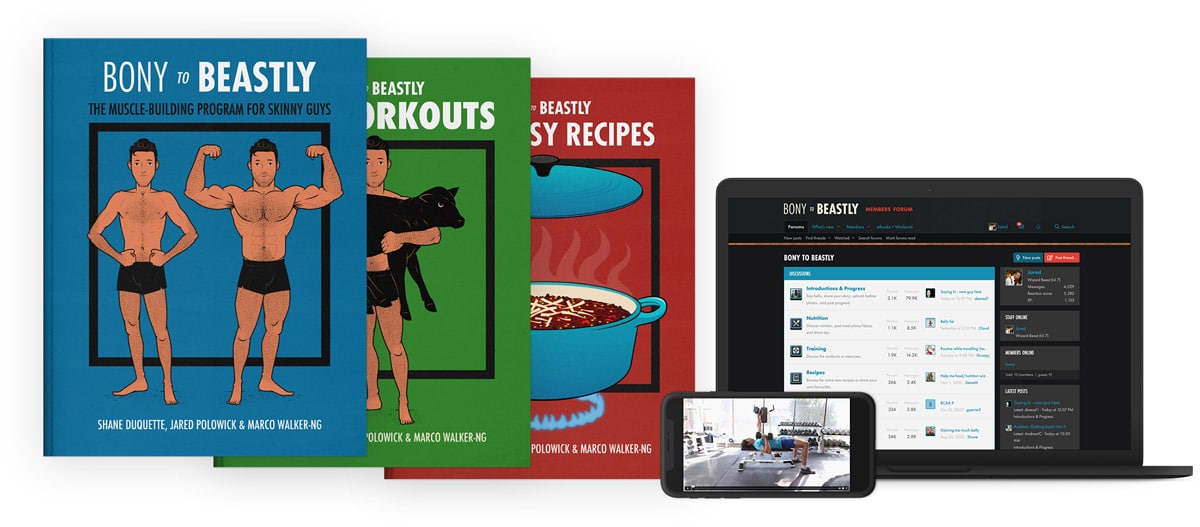
Alright, that’s it for now. If you want more muscle-building information, we have a free bulking newsletter for skinny guys. If you want a full foundational bulking program, including a 5-month full-body workout routine, diet guide, recipe book, and online coaching, check out our Bony to Beastly Bulking Program. Or, if you want a customizable intermediate bulking program, check out our Outlift Program.

